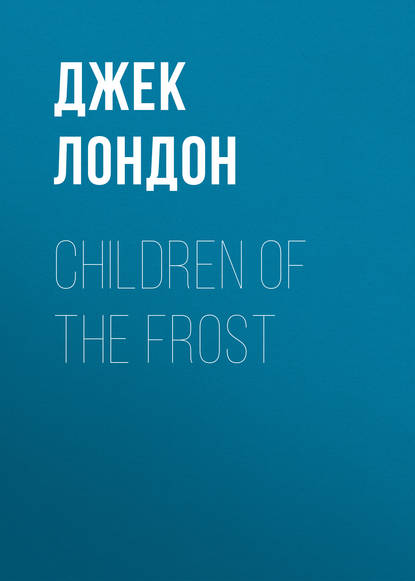По всем вопросам обращайтесь на: info@litportal.ru
(©) 2003-2024.
✖
Children of the Frost
Настройки чтения
Размер шрифта
Высота строк
Поля
LI WAN, THE FAIR
"The sun sinks, Canim, and the heat of the day is gone!"
So called Li Wan to the man whose head was hidden beneath the squirrel-skin robe, but she called softly, as though divided between the duty of waking him and the fear of him awake. For she was afraid of this big husband of hers, who was like unto none of the men she had known. The moose-meat sizzled uneasily, and she moved the frying-pan to one side of the red embers. As she did so she glanced warily at the two Hudson Bay dogs dripping eager slaver from their scarlet tongues and following her every movement. They were huge, hairy fellows, crouched to leeward in the thin smoke-wake of the fire to escape the swarming myriads of mosquitoes. As Li Wan gazed down the steep to where the Klondike flung its swollen flood between the hills, one of the dogs bellied its way forward like a worm, and with a deft, catlike stroke of the paw dipped a chunk of hot meat out of the pan to the ground. But Li Wan caught him from out the tail of her eye, and he sprang back with a snap and a snarl as she rapped him over the nose with a stick of firewood.
"Nay, Olo," she laughed, recovering the meat without removing her eye from him. "Thou art ever hungry, and for that thy nose leads thee into endless troubles."
But the mate of Olo joined him, and together they defied the woman. The hair on their backs and shoulders bristled in recurrent waves of anger, and the thin lips writhed and lifted into ugly wrinkles, exposing the flesh-tearing fangs, cruel and menacing. Their very noses serrulated and shook in brute passion, and they snarled as the wolves snarl, with all the hatred and malignity of the breed impelling them to spring upon the woman and drag her down.
"And thou, too, Bash, fierce as thy master and never at peace with the hand that feeds thee! This is not thy quarrel, so that be thine! and that!"
As she cried, she drove at them with the firewood, but they avoided the blows and refused to retreat. They separated and approached her from either side, crouching low and snarling. Li Wan had struggled with the wolf-dog for mastery from the time she toddled among the skin-bales of the teepee, and she knew a crisis was at hand. Bash had halted, his muscles stiff and tense for the spring; Olo was yet creeping into striking distance.
Grasping two blazing sticks by the charred ends, she faced the brutes. The one held back, but Bash sprang, and she met him in mid-air with the flaming weapon. There were sharp yelps of pain and swift odors of burning hair and flesh as he rolled in the dirt and the woman ground the fiery embers into his mouth. Snapping wildly, he flung himself sidewise out of her reach and in a frenzy of fear scrambled for safety. Olo, on the other side, had begun his retreat, when Li Wan reminded him of her primacy by hurling a heavy stick of wood into his ribs. Then the pair retreated under a rain of firewood, and on the edge of the camp fell to licking their wounds and whimpering by turns and snarling.
Li Wan blew the ashes off the meat and sat down again. Her heart had not gone up a beat, and the incident was already old, for this was the routine of life. Canim had not stirred during the disorder, but instead had set up a lusty snoring.
"Come, Canim!" she called. "The heat of the day is gone, and the trail waits for our feet."
The squirrel-skin robe was agitated and cast aside by a brown arm. Then the man's eyelids fluttered and drooped again.
"His pack is heavy," she thought, "and he is tired with the work of the morning."
A mosquito stung her on the neck, and she daubed the unprotected spot with wet clay from a ball she had convenient to hand. All morning, toiling up the divide and enveloped in a cloud of the pests, the man and woman had plastered themselves with the sticky mud, which, drying in the sun, covered their faces with masks of clay. These masks, broken in divers places by the movement of the facial muscles, had constantly to be renewed, so that the deposit was irregular of depth and peculiar of aspect.
Li Wan shook Canim gently but with persistence till he roused and sat up. His first glance was to the sun, and after consulting the celestial timepiece he hunched over to the fire and fell-to ravenously on the meat. He was a large Indian fully six feet in height, deep-chested and heavy-muscled, and his eyes were keener and vested with greater mental vigor than the average of his kind. The lines of will had marked his face deeply, and this, coupled with a sternness and primitiveness, advertised a native indomitability, unswerving of purpose, and prone, when thwarted, to sullen cruelty.
"To-morrow, Li Wan, we shall feast." He sucked a marrow-bone clean and threw it to the dogs. "We shall have flapjacks fried in bacon grease, and sugar, which is more toothsome – "
"Flapjacks?" she questioned, mouthing the word curiously.
"Ay," Canim answered with superiority; "and I shall teach you new ways of cookery. Of these things I speak you are ignorant, and of many more things besides. You have lived your days in a little corner of the earth and know nothing. But I," – he straightened himself and looked at her pridefully, – "I am a great traveller, and have been all places, even among the white people, and I am versed in their ways, and in the ways of many peoples. I am not a tree, born to stand in one place always and know not what there be over the next hill; for I am Canim, the Canoe, made to go here and there and to journey and quest up and down the length and breadth of the world."
She bowed her head humbly. "It is true. I have eaten fish and meat and berries all my days and lived in a little corner of the earth. Nor did I dream the world was so large until you stole me from my people and I cooked and carried for you on the endless trails." She looked up at him suddenly. "Tell me, Canim, does this trail ever end?"
"Nay," he answered. "My trail is like the world; it never ends. My trail is the world, and I have travelled it since the time my legs could carry me, and I shall travel it until I die. My father and my mother may be dead, but it is long since I looked upon them, and I do not care. My tribe is like your tribe. It stays in the one place – which is far from here, – but I care naught for my tribe, for I am Canim, the Canoe!"
"And must I, Li Wan, who am weary, travel always your trail until I die?"
"You, Li Wan, are my wife, and the wife travels the husband's trail wheresoever it goes. It is the law. And were it not the law, yet would it be the law of Canim, who is lawgiver unto himself and his."
She bowed her head again, for she knew no other law than that man was the master of woman.
"Be not in haste," Canim cautioned her, as she began to strap the meagre camp outfit to her pack. "The sun is yet hot, and the trail leads down and the footing is good."
She dropped her work obediently and resumed her seat.
Canim regarded her with speculative interest. "You do not squat on your hams like other women," he remarked.
"No," she answered. "It never came easy. It tires me, and I cannot take my rest that way."
"And why is it your feet point not straight before you?"
"I do not know, save that they are unlike the feet of other women."
A satisfied light crept into his eyes, but otherwise he gave no sign.
"Like other women, your hair is black; but have you ever noticed that it is soft and fine, softer and finer than the hair of other women?"
"I have noticed," she answered shortly, for she was not pleased at such cold analysis of her sex-deficiencies.
"It is a year, now, since I took you from your people," he went on, "and you are nigh as shy and afraid of me as when first I looked upon you. How does this thing be?"
Li Wan shook her head. "I am afraid of you, Canim, you are so big and strange. And further, before you looked upon me even, I was afraid of all the young men. I do not know … I cannot say … only it seemed, somehow, as though I should not be for them, as though …"
"Ay," he encouraged, impatient at her faltering.
"As though they were not my kind."
"Not your kind?" he demanded slowly. "Then what is your kind?"
"I do not know, I …" She shook her head in a bewildered manner. "I cannot put into words the way I felt. It was strangeness in me. I was unlike other maidens, who sought the young men slyly. I could not care for the young men that way. It would have been a great wrong, it seemed, and an ill deed."
"What is the first thing you remember?" Canim asked with abrupt irrelevance.
"Pow-Wah-Kaan, my mother."
"And naught else before Pow-Wah-Kaan?"
"Naught else."
But Canim, holding her eyes with his, searched her secret soul and saw it waver.
"Think, and think hard, Li Wan!" he threatened.
She stammered, and her eyes were piteous and pleading, but his will dominated her and wrung from her lips the reluctant speech.
"But it was only dreams, Canim, ill dreams of childhood, shadows of things not real, visions such as the dogs, sleeping in the sun-warmth, behold and whine out against."
"Tell me," he commanded, "of the things before Pow-Wah-Kaan, your mother."
"They are forgotten memories," she protested. "As a child I dreamed awake, with my eyes open to the day, and when I spoke of the strange things I saw I was laughed at, and the other children were afraid and drew away from me. And when I spoke of the things I saw to Pow-Wah-Kaan, she chided me and said they were evil; also she beat me. It was a sickness, I believe, like the falling-sickness that comes to old men; and in time I grew better and dreamed no more. And now … I cannot remember" – she brought her hand in a confused manner to her forehead – "they are there, somewhere, but I cannot find them, only …"
"Only," Canim repeated, holding her.
"Only one thing. But you will laugh at its foolishness, it is so unreal."
"Nay, Li Wan. Dreams are dreams. They may be memories of other lives we have lived. I was once a moose. I firmly believe I was once a moose, what of the things I have seen in dreams, and heard."

















